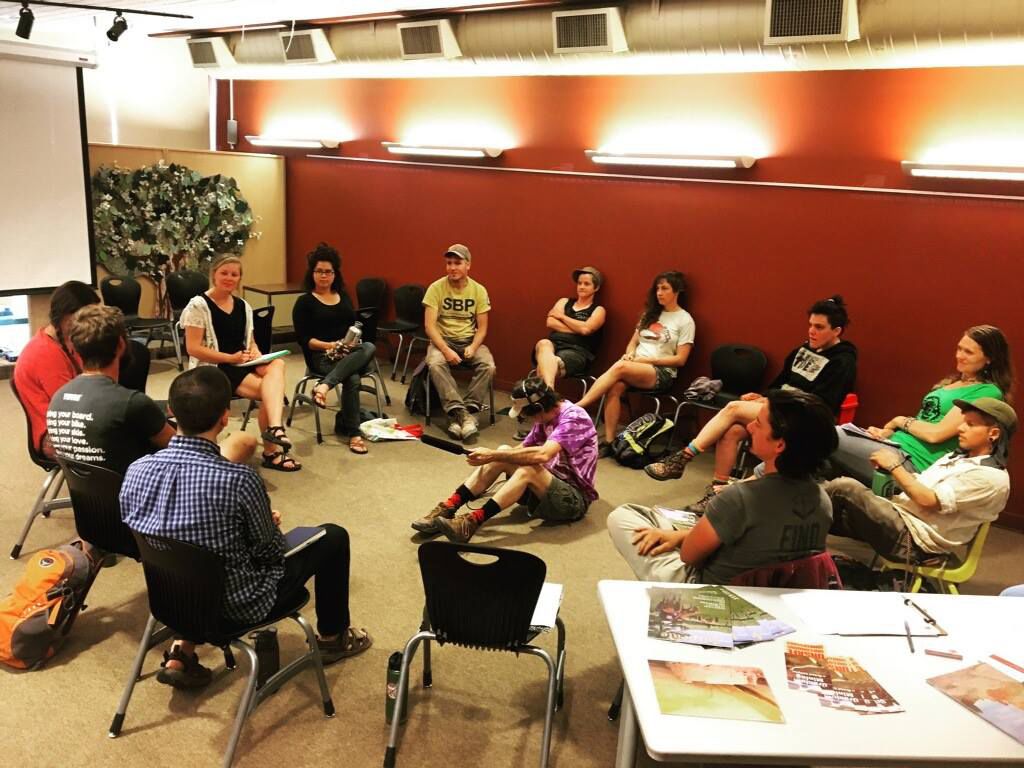On Friday, May 6, young activist leaders met with a roomful of Moab residents at the Grand County Public Library to discuss their vision of the future, given what they know about current human and environmental conditions, and sustainability issues on the Colorado Plateau.
Several former and current interns from local affordable housing nonprofit Community Rebuilds, members of direct-action group Canyon Country Rising Tide, and even visitors active in community engagement were among the under-40 crowd who joined the dialogue.
The conversation was among the last of nine facilitated by organizers from “Uplift,” a new entity in the region’s conservation movement, with young people in population centers in Arizona, Colorado, New Mexico and Utah.
Asked what is and isn’t working to address climate change in Moab, the attendees spoke from their experiences in direct-action protests, as well as participation in the political process and the workforce.
“On the regional level, I think people show up and can plug into … traditional (political) processes, and that is working on the local level,” Canyon Country Rising Tide member Sarah Stock said.
What is not working, however, is action that seeks to influence leaders and stakeholders empowered by systems with financial and institutional backing inaccessible to most demographics, including young people, she said.
Toward that end, Canyon Country Rising Tide member Jeremy Lynch added that the group has succeeded when it connects personally with policymakers to educate and communicate.
“Backyard gatherings are important and effective,” he said. “But we can get stuck in this pattern where we’re just teaching each other over and over what we all already know.”
Garrett Miller, a participant from Detroit, said he has seen a great deal of success at the regional level when persistent communication is finally acknowledged by policymakers. He cited that city’s mass transit overhaul and expansion in electrical car infrastructure as wins in the battle to adapt to climate change there.
“We’re changing the conversation, and that’s the key,” he said. “People are admitting there is a problem, and that’s the first step.”
The group shared a common concern that the political and economic systems in the United States are currently producing results that aren’t in line with a vision for thriving humans on a healthy planet. However, they also voiced agreement that the mechanisms keeping current marketplace and public decision-making processes humming along will be valuable and worth maintaining in the future.
An older member of another local conservation organization who declined to give his name expressed what he said was a common belief among people in his generation that young people “don’t care,” drawing some surprised reactions from the activists in attendance. He encouraged the group to be “angrier” and more active, but to keep in mind the necessity of meeting the “other side” halfway.
“I think it’s a somewhat common (misconception) that we’re not angry,” Grand Canyon Trust Uplift Coordinator Claire Martini told Moab Sun News. “We see what’s going on, and we are aware of the opportunity costs. But we’re living this, we can’t live in anger. For us, it’s a personal thing; we’re trying to demonstrate an alternative world, to show policymakers where that money could be going. For us it’s not just about strip mining and clean water, it’s about this other world we’re building.”
Bridging the communication gap between age-related demographics is a key goal for Uplift, said Grand Canyon Trust Volunteer Coordinator Emily Thompson.
“I think there’s that misconception in both generations,” Thompson said. “Young people don’t feel heard, and older people don’t think they’re doing anything. That’s a misunderstanding we want to address. It’s important to bring all these voices to decision-makers – and that could be a real benefit of this organization.”
The mission of the Grand Canyon Trust, a nonprofit conservation advocacy organization headquartered in Flagstaff, Arizona, is to protect the air, water and wildlife of the Colorado Plateau. The organization carries as its standard the vision of a Colorado Plateau humming along forever with its diverse plant, animal and human inhabitants coexisting and thriving in harmony, said Thompson.
“The way we think about youth and conservation is that conservation just isn’t sustainable without youth involvement,” Thompson said.
Uplift began to take shape in November 2014, when 10 college students in their early 20s gathered at Kane Ranch near the Grand Canyon and worked out how young people focused on understanding and solving growing climate-driven problems on the Colorado Plateau could gather for meaningful dialogue and action. Supported by Grand Canyon Trust and the Landscape Conservation Initiative, the first Uplift conference last year engaged nearly 100 young people in discussions that sparked a new focus on climate change and social justice in the context of climate change.
In preparation for this year’s Uplift conference, which will be held in Durango, Colorado, in August, Uplift’s leaders – all under age 25 – spent several weeks this spring traveling to meet their peers and make personal connections. The meeting in Moab was one of the most well-attended, Martini said.
“It was so inspiring to see this turnout, and how much young people are doing here,” she said.
Ahead of regional Uplift conference, attendees strategize on climate change and sustainability
It was so inspiring to see this turnout, and how much young people are doing here.




